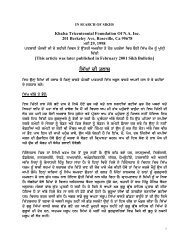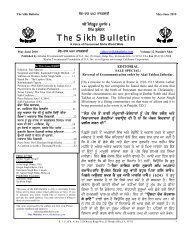You also want an ePaper? Increase the reach of your titles
YUMPU automatically turns print PDFs into web optimized ePapers that Google loves.
<strong>The</strong> <strong>Sikh</strong> <strong>Bulletin</strong> vYswK 537 April 2005<br />
“we do not want to have anything to do with the Gurdwara.<br />
Our fathers fight there like animals; we won’t want to stoop<br />
down to get mixed in things like that”. Though these were<br />
not exactly her words, yet it is a strong statement of<br />
alienation in whichever way it is stated, and indicates a major<br />
problem in transmission of religion.<br />
A similar situation occurred at a conference 2 in Los Angeles.<br />
A young man got up and asked, “ what was the use of<br />
keeping hair” Later on when I talked to him personally, he<br />
said that he was really sick and tired of hypocrisy of his<br />
elders who stressed more on the external symbols but<br />
themselves lacked certain basic prerequisites to become a<br />
good <strong>Sikh</strong>. <strong>The</strong>y could not answer his questions on <strong>Sikh</strong><br />
religion and Scriptures, but expected him to just follow their<br />
directions without reasoning. He further added that many of<br />
his friends had similar complaints against their parents.<br />
<strong>The</strong> most common complaint of <strong>Sikh</strong> youth is that they are<br />
forced by their parents to go to Gurdwara and sit in the<br />
congregation, where they get bored because they do not<br />
understand a singly word of KIRTAN or lectures that are<br />
delivered in Punjabi. If they have any questions about<br />
religion, neither their parents nor the GRANTHIS of the<br />
Gurdwara, most of who know little or no English, can<br />
answer.<br />
In spite of these shortcomings, a small but significant number<br />
of young <strong>Sikh</strong>s attend Gurdwara services and try to learn the<br />
teachings of our great Gurus. Many attend seminars and<br />
summer camps in quest of answers to their questions about<br />
<strong>Sikh</strong> history and religion. However, when they get illogical<br />
answers to their questions, or half-baked sermons instead, or<br />
one simple answer, “in matters religions, you are not to<br />
reason why”, they get frustrated and disenchanted. Let me<br />
cite one example to illustrate this point:<br />
Recently, in a summer camp in Southern California, a learned<br />
speaker from India was narrating the story of the sixth Guru,<br />
Guru Hargobind when he went on a hunting expedition with<br />
emperor Jehangir, and grass cutter, hearing that the Guru was<br />
visiting there, came to have his DARSHAN. <strong>The</strong> tents of the<br />
Guru and the emperor were in juxtaposition, and the grass<br />
cutter, by mistake, entered the tent of the emperor. He placed<br />
two PAISA, the total of his day’s earning in front of the<br />
emperor, bowed in reverence and begged for the grace of the<br />
SACHA PATSHAH (the true emperor). After exchanging a<br />
few words with the grass cutter the emperor was touched and<br />
offered an estate and worldly riches to him. <strong>The</strong> grass cutter<br />
realized that he had come to the wrong tent. He then picked<br />
his two PAISA and walked out of the emperor’s tent.<br />
At this point, a 15 year old asked, “the Guru went hunting,<br />
does it mean that he was a non-vegetarian” <strong>The</strong> answer from<br />
the speaker was an unqualified NO. He said, “the Guru was<br />
vegetarian; hunting was only his hobby”. <strong>The</strong> young boy<br />
kept quiet but when he came home, the first question he<br />
asked his father was, “why killing innocent animals was the<br />
hobby of the sixth Guru” I will leave to the readers to<br />
determine the benefit of such a camp.<br />
I do not imply that all camps have similar occurrences, or<br />
that they are not beneficial to the attendees; but that the<br />
instructions in the camps have to be discreet and free from<br />
personal bias. All discussions should be candid and strictly<br />
based on the teachings of Guru Granth Sahib. Furthermore,<br />
a week in a camp every year may not be sufficient for a<br />
young person to learn enough about <strong>Sikh</strong> history and <strong>Sikh</strong><br />
Scriptures. This way they cannot achieve a level of<br />
knowledge about the religion so that they could answer the<br />
questions of their peers in the school.<br />
Since almost all Gurdwaras conduct their services in<br />
Punjabi and most young <strong>Sikh</strong>s do not speak or understand<br />
this language, because their primary language is English,<br />
they are reluctant to attend the Gurdwara services. When we<br />
force them to learn Punjabi, so that they could understand<br />
the scriptures and the Gurdwara services, we are probably<br />
putting cart before the horse.<br />
It would be appropriate, at this point to do some soul<br />
searching and ask ourselves – how many of our generation,<br />
whose mother language is Punjabi, either understand or can<br />
interpret the Scriptures (Guru Granth Sahib, Varan Bhai<br />
Gurdas, etc.) correctly Quite often, it has been noticed that<br />
the meanings of a Gurbani stanza are either misunderstood<br />
or purposely distorted in order to serve our purpose.<br />
For example, I recently attended a reception for the<br />
marriage of a friend’s daughter. I was a bit late, so when I<br />
reached there a small crowd had already gathered around the<br />
bar (as is the custom on most <strong>Sikh</strong> functions). I approached<br />
and asked for a soft drink. An old acquaintance, who was<br />
standing nearby with a glass of whisky – and probably at his<br />
second (or third) drink, asked as to why I was not drinking<br />
alcoholic beverage on such a joyous occasion On hearing<br />
my answer that I had quit drinking, he said, “how could you<br />
consider yourself to be a good <strong>Sikh</strong>, when Guru Nanak<br />
himself has said:<br />
Kwxw pIxw pivqRü hY idqonu irjku sMbwih ] SGGS, P. 472.<br />
And explained the meaning of this stanza as follows:<br />
“Whatever God has provided us for eating or drinking, is<br />
sanctified”. So drinking is allowed in <strong>Sikh</strong>ism.<br />
<strong>The</strong> main problem is that we take a sentence or a part of a<br />
stanza out of a hymn and (mis)interpret it. Such a<br />
misinterpretation could be out of ignorance, or to serve our<br />
purpose for a particular occasion. In either case, it will have<br />
a deleterious effect on our young listeners. A glaring<br />
example of such misinterpretation of the stanza:<br />
<strong>The</strong> <strong>Sikh</strong> Center Roseville, 201 Berkeley Ave, Roseville, CA. 95678 17
















